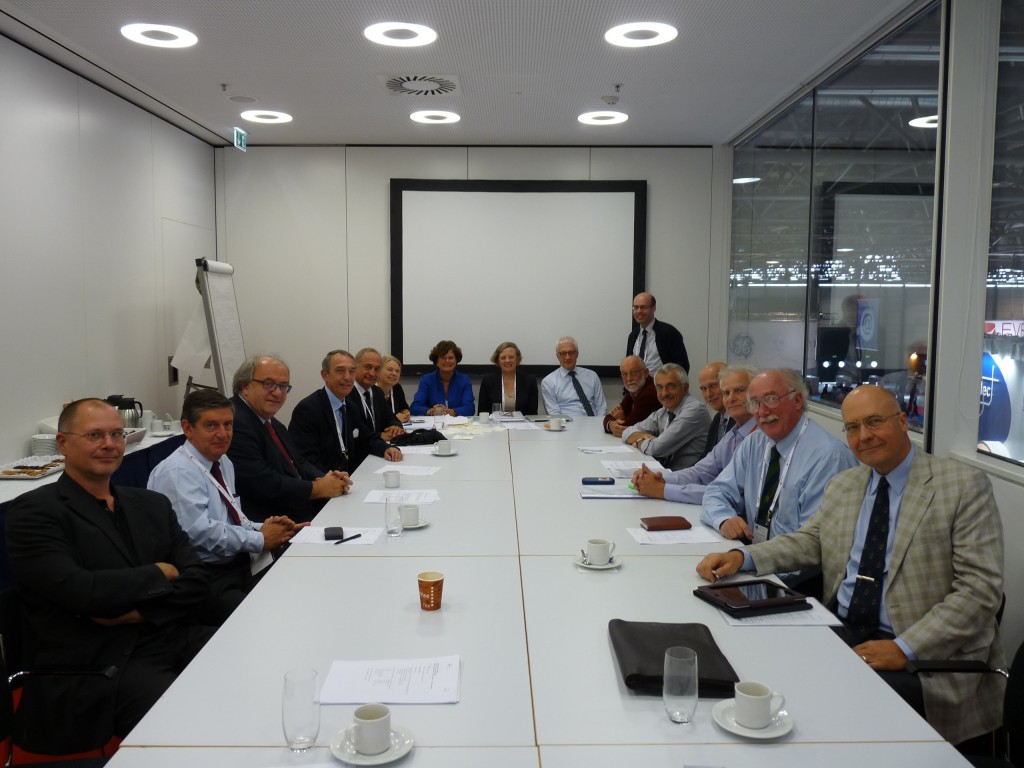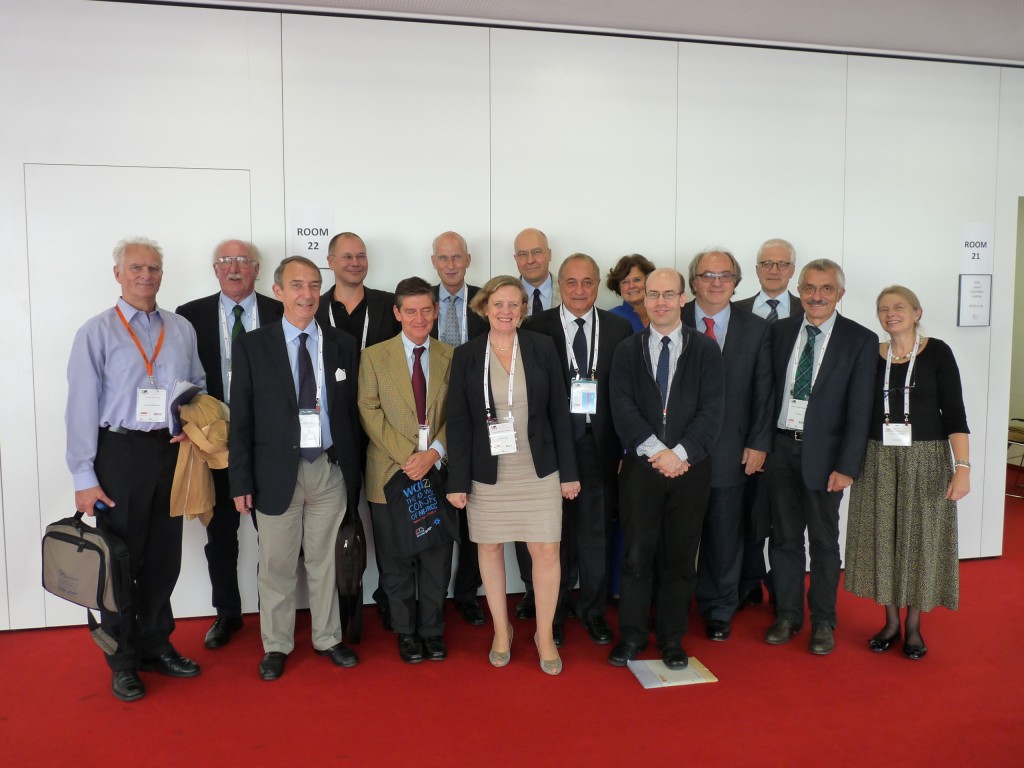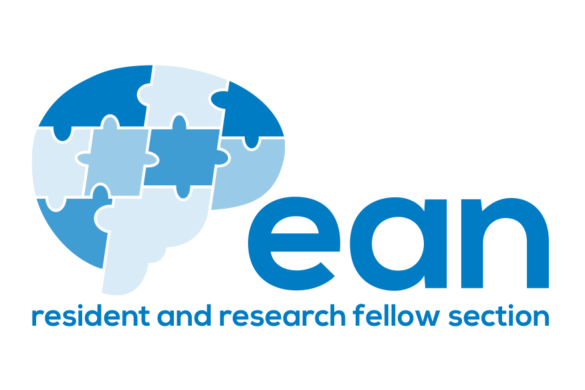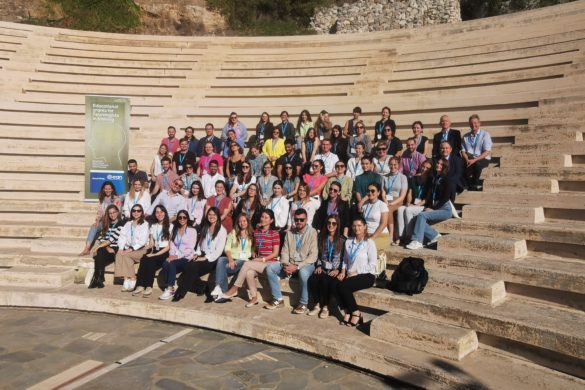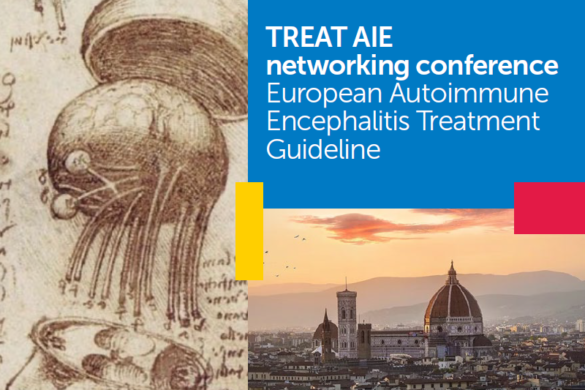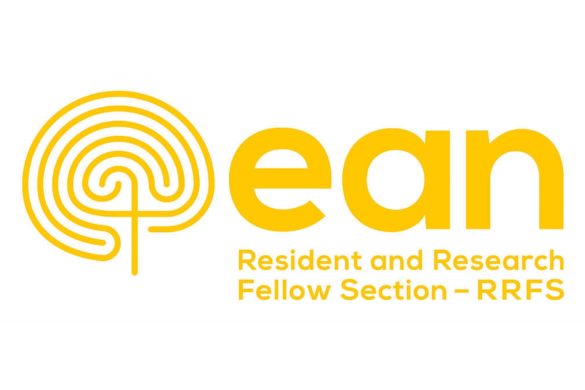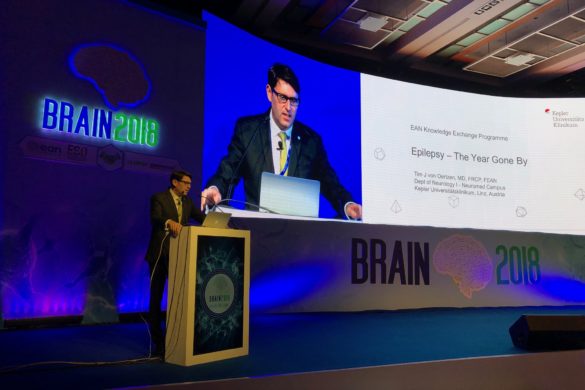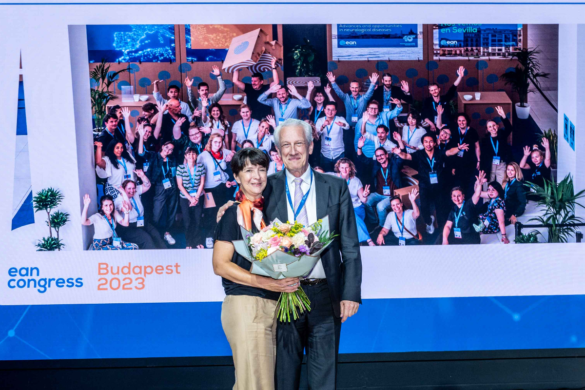by Gunhild Waldemar and Eveline Sipido
I. Liaison Committee Revised Mandate
Following the decision to form a joint EFNS-ENS Liaison Committee the mandate for the LC has been revised, and the list of LC members now also include ENS representatives. Furthermore Jes Olesen and Gregorz Opala stepped down as they reached the end of their term. Richard Hughes will be the EBC delegate together with Gustave Moonen (ENS).
Liaison Committee revised mandate: please go to
http://www.efns.org/Liaison-Committee.31.0.htl
II. EFNS/ENS Transitional Task Force (TTF)
1. Two meetings of the Transitional Task Force (TTF) took place since the meeting at the EFNS Congress in Stockholm (September 2012) – November 2012 (Paris, France) and June 2013 (Barcelona, Spain). A meeting of the TTF is scheduled to take place during the WCN (September 2013 Vienna, Austria.´
2. In brief:
a. The byelaws for the new EAN have been completed
b. the cooperation agreement about the collaboration of the two societies in the transitional time period was signed by EFNS and ENS in Budapest, Hungary during the EFNS congress;
c. The time plan for the merge of the two societies has been advanced, and the EAN will be established as a new society on the last day of the joint EFNS-ENS conference in Istanbul in 2014.
d. The TTF is working on a procedure for the nomination of delegates for the first general assembly of the EAN and also a procedure to selection and voting of officers for the first EAN board.
e. A joint conference organising committee have agreed on the structure of the 2014 joint conference, a structure which may be copied to the future EAN conferences.
f. The future EAN congresses will take place in early June. The venue for the first EAN congress in 2015 will be in Berlin, Germany. The venues for the 2016 and 2017 conferences will be Copenhagen and Amsterdam The procedure for selection of congress venues for EAN congresses 2018 an onwards will be determined by the new EAN board.
g. Following recommendation from the TTF the EFNS and ENS management committees have approved the formation of a joint Liaison Committee which will start developing the liaison strategy for EAN (and for the transitional period). The TTF has also discussed the possibility of a Brussels branch office for Liaison activities and the future policy on collaborating with disease-specific societies and has asked the LC to develop draft proposals (matters pending).
h. The TTF recommends matching scientific panels of the two societies to collaborate and merge
i. The TTF is entrusted selecting publishing company for the new journal of the EAN.
j. The TTF invited the Liaison Committee to develop a process for the launch of the new society at the 2014 Istanbul congress.
k. There are still a number of important points and logistics concerning the merge of the two societies which need to be worked on by the TTF.
III. EAN Office in Brussels
At the March meeting of the EFNS/ENS Management Committee, the proposal submitted was approved. A site visit of the office located within the University Foundation in Brussels is planned for February 2014.
IV. European Medicines Agency (EMA)
The European Medicines Agency is at the core of the European Union’s medicine and health system, and aims to protect human and animal health. To ensure that the system works effectively, the Agency works closely with its partners and stakeholders, and is a proactive member of important networks in Europe and beyond.
The Agency has been interacting with European healthcare professionals in various areas of its work since it was founded in 1995. As users of the medicines that the Agency evaluates, healthcare professionals are key stakeholders in the Agency’s work and have specific knowledge and expertise to offer. European neurologists frequently contribute to the following activities:
• being members of its scientific committees;
• responding to specific requests from the Agency’s scientific committees and working parties;
• taking part in scientific advisory groups;
• reviewing information on medicines prepared by the Agency;
• being involved in the preparation of guidelines;
• Regularly taking part in Agency conferences and workshops.
EFNS successfully applied to be part of the since 2011 established framework for interaction. This framework ensures that the Agency has direct contact with a wide range of healthcare professionals representing the needs and concerns of healthcare professionals across Europe.
It will be very important for EAN to maintain this cooperation.
Prof. Marianne De Visser is EFNS delegate to EMA.
V. PR @ conferences:
From October 2012 to July 2013, EFNS had printed materials on display at over 30 European and International congresses/meetings. Budgetary restrictions limited our effective presence with a booth at congresses (except for AAN and ESC).
Printed materials were also made available at the Regional Teaching courses organised in Eastern Europe, Sub-Saharan Africa and the EFNS Spring School.
Eveline Sipido and Julia Mayer contacted the different scientific societies and/or congress organisers and the dispatching of the EFNS materials was organised through the EFNS Head Office. Very positive reactions with regard to this “exchange” of materials on literature tables have been received.
VI. EBC: European Brain Council
At the 2012 General Assembly, it was decided to globally revise the EBC statutes in order to become more inclusive towards European societies and associations. A working party will look into this matter. Prof. Richard Hughes is a member of this working party.
Mr. Nicholas Deeming was appointed Executive Director to EBC, on a consultancy basis, with effect from April 2013, as Dr Alastair Benbow left EBC in December 2012.
In cooperation with all EBC member societies, Mr. Deeming has started a global revision of EBC, its mission and goal, the working structure, financial procedures and future, including a planning exercise for the Year of the Brain. Mr. Deeming and the EBC team are working closely with the Boston Consulting Group (BCG), a global management consultancy, on a pro bono basis. BCG is assisting in the review of both EBC and YOB.
EBC welcomed a new member: the ESO – European Stroke Organisation joined EBC as an observer. Prof. M. Brainin will be the delegate to EBC.
EBC and EC: EBC has been heavily involved in the EC initiative “European Month of the Brain” (EMoB). Maire Geoghegan Quinn, EC Commissioner for Research, declared May 2013 the month to be dedicated to brain research. Two major conferences were organised in Brussels and Dublin addressing past successes and future challenges. Mrs. M. Baker, Prof. Richard Hughes and other EBC Board members were involved in both events
EBC projects: EBC is involved in several EC as well as other projects. EBC’s involvement varies according to the project.
– PARADISE: is an EC funded project. EBC was responsible for the dissemination of the project’s results and publications;
– HTA – Health Technology Assessment: is an FP7 funded project in cooperation with the London School of Economics (LSE) aiming at improving the HTA process. EBC’s role is to represent the patients’ perspective on the quality of life and other aspects of HTA.
– Ox-Paq project aims at developing a theoretically informed generic patient reported outcome measure to assess the impact of ill-health on participation, activities and autonomy.
– NERRI – Neuro Enhancement: Neuro-enhancement has ethical, economical, social, legal dimensions that require an in-depth investigation and analysis. The project considers these complexities in the framework of responsible research and innovation.
– NBC – NAG: Several National Brain Councils/National Action Groups were set up during the year in Turkey, Finland, The Netherlands and Switzerland. Prof. J. Kesselring and Prof. Christian Hess were key to the realisation of the Swiss Brain Council.
VII. EFNA – European Federation of Neurological Associations:
EFNA held an ‘Advocate for Neurology’ workshop in February 2013. Almost 70 delegates from European neurology patient groups attended. Participants were informed of plans for EMOB and encouraged to get involved through interactive workshops on fundraising, advocacy, running a media campaign, etc. MEP, Nessa Childers and Philippe Cupers of DG Research attended as special guest speakers.
Delegates were asked to complete a ‘key messages’ questionnaire. The subsequent analysis formed the basis for the EFNA Pledge to protect neuroscience research and neurology patients. This was launched at the official kick-off event for EMOB at the European Parliament on April 23rd. On May 7, 20 MEPs signed the pledge, which is now available online.
Our President was the only patient representative on the EMOB Independent Steering Committee, convened by the EC to plan two keynote conferences in Brussels and Dublin respectively. We were also involved in other events, including a joint conference with the European Patients Forum, attended by Commissioner Tonio Borg.
EFNA organised two workshops on the topic of Pharmaceutical Pricing, Access and Reimbursement at the London School of Economics in 2013. This important initiative was aimed at equipping patient representatives with the knowledge and skills they need to be actively involved in influencing regulatory decision-making in relation to medical technologies/pharmaceuticals.
EFNA held our General Assembly 2013 and our Annual Ideas Exchange Forum at World Congress of Neurology. We also acquired 18sqm in the Exhibition Centre at the event to run a ‘Patients Corner’. EFNA also co-chaired/organised a session on the programme entitled ‘Making a Case for Neurology’. The aim of this session was to highlight how patients can work with other key stakeholders to achieve change.
EFNA re-developed our existing website. We also engaged with social media – Twitter and Flickr. A new leaflet ‘Get to Know EFNA’ was published. A new bi-monthly EFNA e-newsletter was also created and is circulated to a growing distribution list.
We had applications for new Membership from the International Bureau for Epilepsy and the European Myasthenia Gravis Associations. The Trigeminal Neuralgia Association of Denmark applied for Associate Membership.
VIII. SBN UEMS – Section /Board of Neurology UEMS
The 5th European Board examination in Neurology took place this year during the ENS congress in Barcelona on June 7th, 2013. 29 candidates attended the examination. For the first time candidates from outside Europe were accepted. (Candidates were from Belgium, Cyprus, Germany, Italy, Portugal, Spain, Turkey, Canada, India, Iraq, Jordan, Saudi Arabia, Singapore, South Africa, and United Arab Emirates). 25 candidates passed the examination and became either fellows of the UEMS/EBN or they received a diploma of the SBN UEMS. (This distinction is necessary, as all European candidates have a locally certified clinical training in an EU/EEA country and Turkey, whereas the other candidates do not have this. The examination has been a joint development of the SBN UEMS with the ENS and EFNS with the contribution of questions by the MDS (Movement Disorder Society), the ESO (European Stroke Organisation) and several other societies and individuals.
In addition to the European Board Examination, UEMS is working on a new European core curriculum in neurology, and maintains a visitation program, both with input from EFNS. Both EFNS and ENS have given strong support to continued cooperation with UEMS-European Board of Neurology, and intend to take it on also for the new EAN.
Also e-Brain donated questions were adapted and used in the question pool.
The SBN UEMS examination in 2014 will take place in Istanbul, at the Joint Congress of the EFNS and ENS.
As there is further interesting and relevant information on the exam please see the article in the July 2013 issue of Neuropenews (by Wolfgang Grisold et al).
IX. Alliance for Biomedical Research in Europe (ABRE).
Prof. Gustave Moonen was elected to the ABRE Board of Directors at the 2012 General Assembly.
The “update to members” posted on the EFNS website summarises very well the Biomed Alliance activities in the past months and we enclose it.
ABRE proceed through Executive Committee meetings (the next is scheduled for August 28th), teleconferences and mails.
A major advance that has largely to be credited to the Biomed Alliance intense lobbying is the decision by the European Commission (EC) to create a European Council for Health Research (ECHR).
This important decision is the result of the involvement of the scientific community with EC policy decisions towards Horizon 2020, the EC’s major action of EU in financing research.
There is currently and also will be an interaction with the EMRC from the ESF- European Science Foundation and with Science Europe.
The ECHR concept paper can be found at: http://www.efns.org/Alliance-for-Biomedical-Health-Research-in-Europe.884.0.html
X. Neurology and Africa – Prof. J-M. Vallat & Schmutzhard
Mediterranean Associate Members Prof. J.-M. Vallat
PAUNS: Associate Membership was granted to one more national neurological society bordering the Mediterranean. Palestine now holds associate membership to the EFNS/ENS.
The delegates of these Associate Member societies will convene at the WCN and are expected to take part in the meeting of the Council of Delegates.
Young Neurologists from Egypt, Morocco and Tunisia participated in the 2013 Spring School.
The organisation of joint sessions at the EFNS congress, on a yearly basis, and at the Pan Arab Union of Neurological Societies – PAUNS meeting every second year, is part of the working agreement.
Profs. Richard Hughes, Jean-Marc Léger and Jacques De Reuck took part in the 7th Joint Session at the PAUNS congress that took place in Egypt in February 2013.
The 8th Joint session of EFNS and its Associate Members from the Mediterranean area will take place during the EFNS Congress in Istanbul, Turkey. The topic to be addressed is: Dementia and Alzheimer’s disease
Regional Teaching Course (RTC) in Sub Saharan Africa
The 5th RTC in Sub-Saharan Africa (July 11 – 13, 2013) returned to Dakar, Senegal and was hosted by Prof. A. Gallo-Diop at the Cheikh Anta Diop University.
The 2013 topics, officially voted in 2011-2012 by the African colleagues are:
* Stroke
* Movement Disorders and Mental Health
* How to publish in an international journal?
This RTC was organised with the help of and in cooperation with several major scientific organisations:
* ENS – European Neurological Society
* WFN – World Federation of Neurology
* IBRO – International Brain Research Organisation
* WSO – World Stroke Organisation
* MDS – Movement Disorders Society
* AAN – American Academy of Neurology
The international faculty was joined by African colleagues from Senegal, Nigeria, Tanzania, Cameroon and Benin.
Thanks to the unrestricted grants received, trainees representing 17 countries of Sub-Saharan Africa could be invited to the RTC.
The meeting was organised to a very high standard, and the quality of the lectures was extremely high. However, the most striking aspects of the course were the quality of the questions, the lively discussion, and the very active participation of the trainees in both French and English.
Plans for 2014 are already under way. In respect of the RTC Roadmap, the course will move from West to East Africa, from a French to an English speaking country. The following countries have been contacted: Zambia – Prof. Anthony Zimba and Mozambique – Prof. Albertino Damasceno. Both have received information on what hosting the RTC would entail for them and answers can be expected by the time of the Liaison Committee meeting.
The topics for the 2014 RTC were identified form the suggestions listed in the evaluation forms the participants compiled at the end of the 5th RTC. For the 2014 RTC, the mostly requested topics are:
Infectious diseases and nerve and muscle diseases
The Task Force will keep you informed on the progress that is made towards the 2014 RTC.
XI. Neuropenews
On January 1, 2012 the first issue of Neuropenews (Co-editors: Gian Luigi Lenzi and David B. Vodušek) was published followed by monthly issues since then. Each month all EFNS members are emailed a summary of the content of the upcoming issue. In addition to the initial categories (Top 12 Article ; Interviews ; Grand Rounds ;Forum ; News from the EFNS ; Miscellaneous ), the EFNS President Prof. R. Hughes kindly agreed to write one article per month for the President’s Page.
The positive aspects of Neuropenews are that acceptance of Neuropenews by EFNS members is so far fair and continuously increasing, as judged by the different visitors, the hits, and the bytes on our web site. In addition to 15,000 members automatically receiving EFNS Neuropenews, 200 persons (especially from non-EFNS member countries) have subscribed to Neuropenews. It is interesting that the country with the largest number of Neuropenews readers is the United States. Positive comments have been received from all over the world. Therefore it was not surprising that the initial meetings with the colleagues from ENS, Prof. J. Ferro and Prof. C. Krarup, in charge of the ENS Newsletters, resulted in adopting Neuropenews as the EFNS-ENS Newsletter until the new EAN Management Committee will decide otherwise.
The less positive aspects are that partner societies, such as MDS-ES, EBC, EFNA, and others have been invited on a regular basis to contribute to Neuropenews, but this inter-relationship so far has not been satisfactory and definitely has to be strengthened. In a similar way some of the Committee chairs have contributed to Neuropenews but others have been unresponsive so far. With little success we invited the EFNS Management Committee members and Committee chairs, to participate in the discussion and send information on the committees and their work, to be published on Neuropenews.
In the future developments of Neuropenews, we are looking for changing the Grand Round category to an interactive neurological case presentation, working in close collaboration with the e-brain Group. Finally, depending on the available budget, a professional science writer could be hired, to improve the level of the English language of our presentations, which reflect more the Tiber and Danubian influence rather than the Thames or Avon flavour.
XII. EAYNT
EAYNT was represented at the 15th EFNS Spring School (former EFNS Academy for Young Neurologists) in Stare Splavy (Czech Republic) by Orsolya Györfi who gave an overview of the EAYNT and the scientific opportunities within the EFNS. An update about the EBN examination was also provided.
At the 23rd Meeting of the ENS in Barcelona the EAYNT Special Session entitled: ‘Emerging clinical and career prospects for junior neurologists’ attracted more than 100 participants. A range of topics including useful career tips, proficiency in neurogenetics and advice on subspecialisation were covered. The speakers were M. Filippi (Italy), M.J. Molnar (Hungary) and E.T. Varga (Hungary). The ENS-EAYNT Session ‘Translational Neurology – a challenge for clinician-scientists’ was attended by more than 200 participants. This initiative of EAYNT aimed to demonstrate the contribution of research in the development of new neurological diagnostic procedures and therapies. The concept of translational Research was described and discussed within various areas of neurology, including coma by S. Laureys (Belgium), vertigo by M. Dieterich (Germany) and neuroimaging by F. Fazekas (Austria). Thanks to the kind invitation by the Congress President Prof. Xavier Montalban, EAYNT members were offered the opportunity of visiting the Department of Neurology-Neuroimmunology of Vall d’Hebron University Hospital in Barcelona. The renowned department welcomed 63 Young Neurologists. Junior neurologists were also contributing to the ENS Meeting as poster chairs.
The programme of the 2013 Word Congress of Neurology in Vienna includes a free half-day teaching course organised by the International Working Group of Young Neurologists and Trainees (IWGYNT) in collaboration with the EAYNT. Speakers from all around the world will provide insights to worldwide junior neurologist initiatives and neurology training in their respective continents. A traditional hospital visit will be arranged as per the kind invitation of Prof. Eduard Auff at the renowned General Hospital of Vienna.
XIII. Danube Symposium
The latest information on the Danube Symposium can be found at: http://www.klinikaikozpont.u-szeged.hu/neur/danube/Newsletter22.pdf
26 August 2013
Approved on 23 September 2013
Professor Gunhild Waldamar is the Liasion Committee Chair of the EFNS and works at the Copenhagen University Hospital, Denmark
Mrs Eveline Sipido is the Liaison officer of the EFNS and works at the EFNS branch office in Florence, Italy

